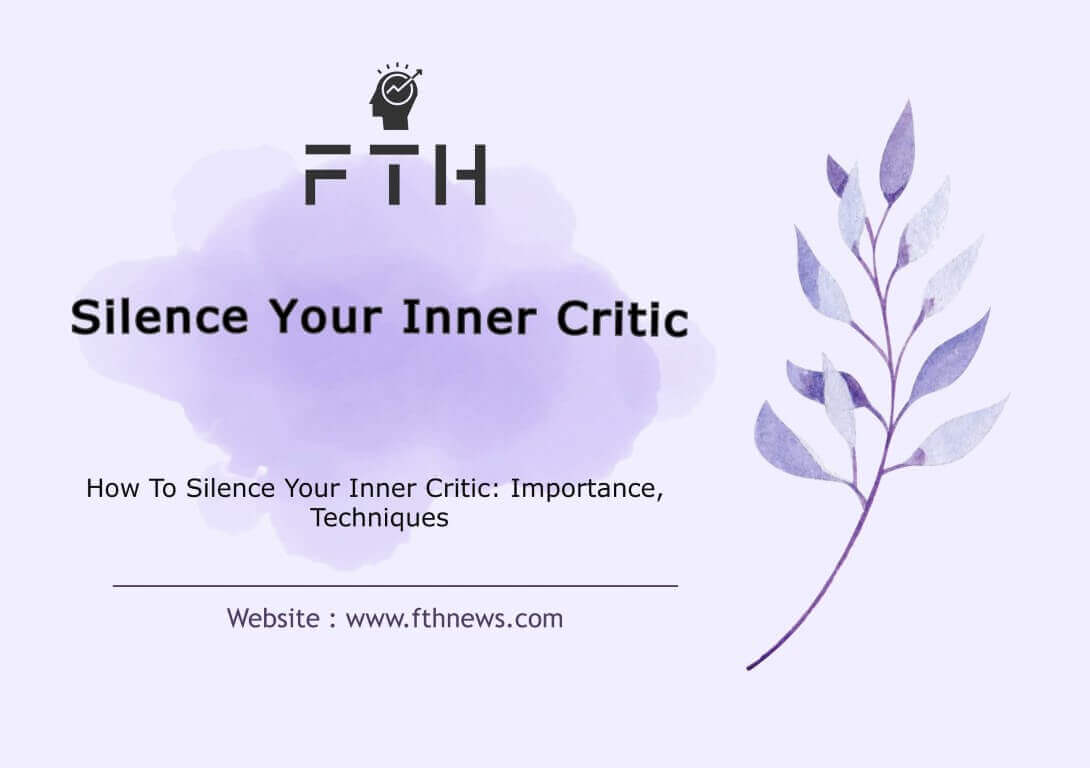
How To Silence Your Inner Critic? In the relentless hustle of modern life, our inner critics often scream louder than any external voices. They nitpick, criticize, and judge our every move, leaving us feeling inadequate and insecure. But what if I told you that silencing that inner critic is not only possible but essential for your well-being and success? Welcome to the journey of mastering self-compassion.
Understanding the Inner Critic
Before we jump into quieting that nagging voice inside, let’s figure out where it comes from. Our inner critic is like a little voice in our heads that’s formed by things that happened to us before, what others expect from us, and when we doubt ourselves. It loves to compare, scare us, and push us to be perfect, which usually makes us feel bad about ourselves and messes things up.
Types of Inner Critics:
- The Perfectionist: This inner critic constantly tells us that nothing we do is ever good enough. It sets impossibly high standards and criticizes us harshly when we inevitably fall short.
- The Comparison Monster: This inner critic loves to compare us to others, highlighting our flaws and shortcomings while magnifying the successes of those around us. It leaves us feeling inadequate and envious.
- The Doom and Gloom Predictor: This inner critic is the worrywart, always predicting the worst possible outcomes and filling us with fear and anxiety about the future. It thrives on catastrophizing and keeps us stuck in a cycle of negativity.
- The Shame Spiraler: This inner critic feeds on our feelings of guilt and shame, reminding us of past mistakes and shortcomings. It convinces us that we are inherently flawed and unworthy of love and acceptance.
Origins of the Inner Critic:
Our inner critics are shaped by a variety of factors, including:
- Past Experiences: Negative experiences from our past, such as criticism from authority figures or failure, can plant the seeds for our inner critics to flourish.
- Societal Expectations: Society bombards us with messages about how we should look, act, and succeed, leading to internalized pressure to measure up to unrealistic standards.
- Self-Doubt: Our own insecurities and fears fuel the fire of our inner critics, amplifying their voices and making it harder for us to silence them.
Understanding the different types of inner critics and where they come from can help us develop targeted strategies for quieting their voices and cultivating a greater sense of self-compassion and acceptance.
The Power of Your Inner Critic
Our inner critic, despite its often negative tone, holds significant influence over our thoughts, feelings, and actions. Understanding its power and importance can help us navigate its impact more effectively.
1. Self-Reflection and Growth
While the inner critic may sometimes feel like our worst enemy, it can also serve as a valuable tool for self-reflection and personal growth. By highlighting areas where we fall short or could improve, it prompts us to assess ourselves honestly and strive for development.
2. Protection Mechanism
Believe it or not, your inner critic’s primary intention is not to harm you but to protect you. It often emerges as a defense mechanism, aiming to shield you from potential failure, rejection, or disappointment. Acknowledging this protective function can help us approach our inner critic with compassion rather than hostility.
3. Motivation and Ambition
While excessive criticism can be detrimental, a healthy dose of self-critique can fuel motivation and ambition. Your inner critic pushes you to strive for excellence, nudging you out of your comfort zone and encouraging you to pursue your goals with vigor and determination.
4. Emotional Regulation
Our inner critic plays a crucial role in regulating our emotions by alerting us to potential threats or challenges. By identifying areas of concern or insecurity, it prompts us to take proactive steps to address them, thereby enhancing our emotional resilience and well-being.
5. Self-Awareness and Authenticity
Embracing your inner critic can deepen your self-awareness and authenticity. By acknowledging and accepting your flaws and limitations, you cultivate a more genuine and compassionate relationship with yourself, fostering greater resilience and inner peace.
6. Catalyst for Change
Ultimately, your inner critic can serve as a catalyst for positive change and transformation. By listening to its messages with curiosity and openness, rather than fear or resistance, you can harness its power to propel you toward greater self-awareness, fulfillment, and success.
In conclusion, while our inner critic may sometimes feel like a formidable adversary, it holds immense importance in shaping our self-perception, behavior, and ultimately, our lives. By embracing its lessons with humility and self-compassion, we can harness its power to cultivate greater resilience, authenticity, and personal growth.
Techniques: How To Silence Your Inner Critic
Learn What is Inner Voice:
Begin by understanding the nature of your inner voice. Your inner voice is like a constant companion in your mind, made up of your thoughts, beliefs, and fears. It’s the voice that narrates your experiences, offers commentary on your actions, and shapes your perception of yourself and the world around you. Realize that this inner dialogue is a reflection of your innermost thoughts and emotions, and acknowledging this is the first step towards gaining control over it.
For example, imagine you’re feeling anxious about an upcoming presentation at work. Your inner voice might start whispering doubts and criticisms: “You’re going to mess up. Everyone will think you’re incompetent.” By recognizing that these thoughts are coming from your inner voice, you can begin to challenge their validity and replace them with more positive and empowering statements.
Learning to understand your inner voice involves tuning in to its messages without judgment and recognizing how they influence your feelings and behavior. By gaining insight into the patterns and triggers of your inner dialogue, you can start to cultivate a healthier and more compassionate relationship with yourself. This self-awareness is the foundation for silencing your inner critic and nurturing a mindset of self-compassion and positivity.
Write Down Your Thoughts:
Take a proactive approach to understanding your inner dialogue by jotting down your thoughts on paper or in a journal. This simple practice can be incredibly powerful in gaining insight into your inner world. By externalizing your thoughts, you create distance from them and gain a clearer perspective.
For example, imagine you’re feeling overwhelmed by self-doubt and negative thoughts about your abilities. Instead of letting these thoughts swirl around in your head, take a few minutes to write them down. Seeing your thoughts written out can make them feel more tangible and manageable. It allows you to examine them more objectively and identify any recurring patterns or themes.
Additionally, writing down your thoughts frees up mental space and reduces the burden of carrying them around in your mind. It’s like decluttering your mental space, making room for more positive and constructive thinking. This practice can be particularly helpful during times of stress or uncertainty when your inner critic may be especially active.
So, grab a pen and paper or open up a journal, and start documenting your inner dialogue. You may be surprised by what you discover and how it can help you cultivate greater self-awareness and resilience.
Mindfulness Meditation:
Try mindfulness meditation, a simple practice where you focus on your breathing and pay attention to the thoughts passing through your mind. For example, imagine you’re sitting quietly, breathing in and out. Suddenly, a thought pops up: “I’m not good enough.” Instead of reacting to this thought, just observe it, like watching a cloud passing by in the sky.
Notice it without getting caught up in it or judging yourself for having it. This helps you become more aware of your inner dialogue and gives you the chance to question whether these thoughts are really true or helpful. It also creates room for kindness towards yourself, which is called self-compassion.
Practice Self-Talk:
Replace self-critical thoughts with compassionate and affirming statements. This means changing the way you talk to yourself in your mind. For example, instead of saying mean things like, “I’m such a failure,” try saying something kind and encouraging, like, “I am doing the best I can, and that is enough.” This shift in self-talk can make a big difference in how you feel about yourself and your abilities. It helps to build self-confidence and resilience, making it easier to overcome challenges and setbacks.
Challenge Perfectionism:
Recognize that perfection is an impossible standard and that making mistakes is a natural part of learning and growing. Instead of aiming for flawless outcomes, focus on progress and improvement. For example, imagine you’re working on a project, and you’re striving for perfection. You spend hours obsessing over every detail, afraid to make a mistake.
But what if you shifted your mindset? What if you embraced the process, knowing that mistakes are opportunities to learn and grow? By letting go of the need for perfection and embracing imperfection, you open yourself up to creativity, innovation, and personal growth. So, next time you catch yourself striving for perfection, remind yourself that it’s okay to make mistakes—it’s all part of the journey toward becoming your best self.
Cultivate Gratitude:
Shift your focus from what you don’t have to what you do have and appreciate about yourself and your life. This means taking time to acknowledge and be thankful for the good things, big or small, in your life. For instance, instead of dwelling on what you wish you had or what you lack, take a moment to appreciate the things that bring you joy, like your health, relationships, or personal accomplishments.
Cultivating gratitude fosters a positive mindset and diminishes the power of the inner critic by reminding you of the abundance and blessings in your life, even during challenging times. So, make it a habit to practice gratitude daily, whether through journaling, meditation, or simply reflecting on the things you’re thankful for.
Set Realistic Expectations:
Be kind to yourself by setting goals that are achievable and by acknowledging your limitations. This means being realistic about what you can accomplish within a given timeframe and accepting that it’s okay to have boundaries and limitations. For example, instead of expecting yourself to complete a big project in one day, break it down into smaller, manageable tasks spread out over several days. This way, you can make progress without overwhelming yourself.
Remember that progress, no matter how small, is still progress. Celebrate your achievements along the way, no matter how minor they may seem, and be patient with yourself as you work towards your goals. By setting realistic expectations, you set yourself up for success while also nurturing your self-esteem and well-being.
Engage in Dialogue with Your Inner Critic:
Instead of fighting against your inner critic, try engaging in a dialogue with it. This means actively questioning the messages it sends you and challenging its assumptions. Here’s how you can do it:
- Ask Probing Questions: When your inner critic starts to speak up, ask yourself questions to understand where these thoughts are coming from. For example, if your inner critic tells you that you’re not good enough, ask yourself why you feel that way and what evidence there is to support that belief.Example: Suppose your inner critic tells you that you’ll never succeed in your career. Ask yourself why you believe that to be true. Is it based on past experiences, fears of failure, or external pressure? By digging deeper, you can uncover the underlying reasons behind your inner critic’s messages.
- Challenge Its Validity: Once you understand where your inner critic’s messages are coming from, challenge their validity. Examine the evidence for and against these beliefs and consider alternative perspectives. Remember that your inner critic’s voice is not always accurate or objective.Example: Suppose your inner critic tells you that you’re unqualified for a promotion at work. Challenge this belief by listing your accomplishments, skills, and qualifications that make you a strong candidate. Consider whether there’s any evidence to support your inner critic’s claim or if it’s based on unfounded fears or insecurities.
Engaging in dialogue with your inner critic allows you to gain insight into its origins and challenge its influence over you. By questioning its messages and examining their validity, you can begin to weaken its hold on your thoughts and cultivate a more compassionate and empowering inner voice.
Seek Support:
Surround yourself with people who care about you and who can offer support during difficult times. This may include friends, family members, or a therapist who can provide guidance, perspective, and encouragement when you need it most. For example, if you’re going through a tough time at work or in your personal life, reaching out to a trusted friend or family member for a listening ear can provide comfort and reassurance.
Additionally, seeking professional help from a therapist can offer valuable insights and coping strategies to navigate challenges more effectively. Remember, it’s okay to ask for help and to lean on others for support when you need it. Building a strong support network can help you feel more resilient and capable of overcoming obstacles in your life.
Distraction:
When your inner critic becomes overwhelming, distract yourself by engaging in activities that shift your focus away from negative thoughts. This could be anything from going for a walk in nature, listening to music, or immersing yourself in a creative hobby like painting or cooking.Example: If you find yourself ruminating on past mistakes, try distracting yourself by taking a break and going for a short walk outside. Notice the sights and sounds around you, and focus on the present moment rather than dwelling on negative thoughts.
Helping Others:
Shift your focus away from your own inner critic by helping others and making a positive impact in their lives. Volunteer your time at a local charity, lend a listening ear to a friend in need, or perform random acts of kindness for strangers.Example: Offer to help a neighbor with their groceries or volunteer at a local food bank. By focusing on helping others, you’ll shift your attention away from your own negative thoughts and experience the satisfaction of making a difference in someone else’s life.
Visualization:
How To Silence Your Inner Critic: Visualization is a powerful technique that involves creating mental images of yourself achieving your goals and overcoming obstacles. By vividly imagining success, you can reprogram your subconscious mind and build confidence in your abilities. Here’s how you can use visualization to silence your inner critic:
Example: Before a challenging situation, such as a job interview or public speaking engagement, take a few moments to visualize yourself performing with confidence and poise. Picture yourself calmly addressing your inner critic and affirming your competence and worth. Imagine the scenario unfolding exactly as you desire, with you feeling empowered and in control.
Affirmations:
How To Silence Your Inner Critic: Affirmations are positive statements that you repeat to yourself regularly to challenge and overcome negative self-talk. By consciously replacing self-critical thoughts with affirming ones, you can cultivate a more positive self-image and boost your self-esteem. Here’s how you can practice affirmations to silence your inner critic:
Example: Start your day by reciting affirmations that resonate with you, such as “I am worthy of love and respect,” “I trust in my abilities to handle challenges,” and “I am deserving of success.” Repeat these affirmations throughout the day, especially when you notice your inner critic becoming active. Over time, these positive statements will become ingrained in your subconscious mind, helping to silence your inner critic and foster self-confidence.
Set Boundaries:
How To Silence Your Inner Critic: Establishing boundaries with your inner critic is crucial for protecting your mental well-being. Recognize when its voice becomes unhelpful or harmful, and learn to tune it out. Here’s how you can set boundaries with your inner critic:
Example: Suppose your inner critic starts bombarding you with thoughts like “You’re not good enough” or “You’ll never succeed.” Instead of engaging with these negative thoughts, consciously redirect your focus toward more constructive and empowering thoughts. Remind yourself of your strengths, past successes, and the progress you’ve made. By setting boundaries and refusing to entertain destructive self-talk, you reclaim control over your inner dialogue.
Practice Forgiveness:
How To Silence Your Inner Critic: Forgiving yourself for past mistakes and shortcomings is essential for silencing your inner critic and fostering self-compassion. Holding onto guilt and self-blame only perpetuates negative self-talk and undermines your self-esteem. Here’s how you can practice forgiveness:
Example: Reflect on a past mistake or failure that still weighs heavily on your mind. Instead of berating yourself for what went wrong, acknowledge that everyone makes mistakes and that it’s a natural part of the learning process. Practice self-forgiveness by releasing any lingering guilt or shame and committing to learning and growing from the experience. By letting go of past regrets and embracing self-compassion, you weaken the grip of your inner critic and cultivate a healthier relationship with yourself.
Surround Yourself with Positivity:
How To Silence Your Inner Critic: Surrounding yourself with positivity is essential for cultivating a supportive environment that uplifts and empowers you. Whether it’s through uplifting books, inspiring podcasts, or supportive relationships, surrounding yourself with positivity can help drown out the voice of your inner critic. Here’s how you can surround yourself with positivity:
Example: Consider curating your social media feed to include accounts and content that inspire and motivate you. Follow accounts that share positive affirmations, personal development tips, and success stories. Limit your exposure to content that triggers feelings of inadequacy or negativity, and prioritize consuming uplifting and encouraging content instead. Additionally, seek out supportive friends and family members who uplift and encourage you on your journey toward self-improvement.
Focus on Personal Growth:
How To Silence Your Inner Critic: Shifting your focus from seeking external validation to prioritizing personal growth and self-improvement is key to silencing your inner critic. Instead of fixating on perfection or seeking approval from others, focus on setting goals that align with your values and aspirations. Here’s how you can focus on personal growth:
Example: Rather than measuring your success solely by external achievements or accolades, focus on the progress you make on your personal growth journey. Set meaningful goals that challenge you to learn, develop new skills, and expand your horizons. Celebrate small victories and milestones along the way, recognizing that progress, no matter how small, is still a step forward. By focusing on personal growth and self-improvement, you shift the narrative away from external validation and cultivate a sense of fulfillment and purpose from within.
Can you get rid of your inner critic?
Getting rid of your inner critic entirely is unlikely, as it’s a natural part of being human. The inner critic serves a purpose in providing feedback and helping us navigate challenges. However, you can manage and quiet your inner critic by developing self-awareness, practicing self-compassion, and implementing strategies to challenge negative self-talk.
Here are some steps you can take to manage your inner critic:
- Recognize its Voice: Become aware of when your inner critic is speaking. Notice the patterns of negative self-talk and the situations that trigger it.
- Challenge Negative Thoughts: Question the validity of your inner critic’s messages. Ask yourself if there is evidence to support these thoughts or if they are based on fear or self-doubt.
- Practice Self-Compassion: Treat yourself with kindness and understanding, especially during difficult times. Replace self-critical thoughts with compassionate and affirming statements.
- Set Boundaries: Establish boundaries with your inner critic by refusing to engage with destructive self-talk. Redirect your focus toward more constructive thoughts and actions.
- Seek Support: Lean on supportive friends, family members, or a therapist who can offer perspective and encouragement during challenging times.
While you may not be able to completely eliminate your inner critic, you can learn to manage its influence and cultivate a more positive and empowering inner dialogue. It takes time and practice, but with patience and perseverance, you can develop a healthier relationship with yourself.
Conclusion
How To Silence Your Inner Critic: In a world that often emphasizes self-criticism over self-compassion, mastering the art of silencing your inner critic is a transformative endeavor. By nurturing self-compassion and employing practical techniques, you can liberate yourself from the shackles of negativity and cultivate a deeper sense of self-worth and fulfillment. So, the next time your inner critic speaks up, remember that you have the power to respond with kindness, understanding, and unwavering self-love.
FAQs How To Silence Your Inner Critic:
Your inner critic might be loud due to past negative experiences, societal pressures, perfectionism, fear of failure, comparison to others, and underlying self-doubt. Recognizing these factors can help you manage its influence effectively.













